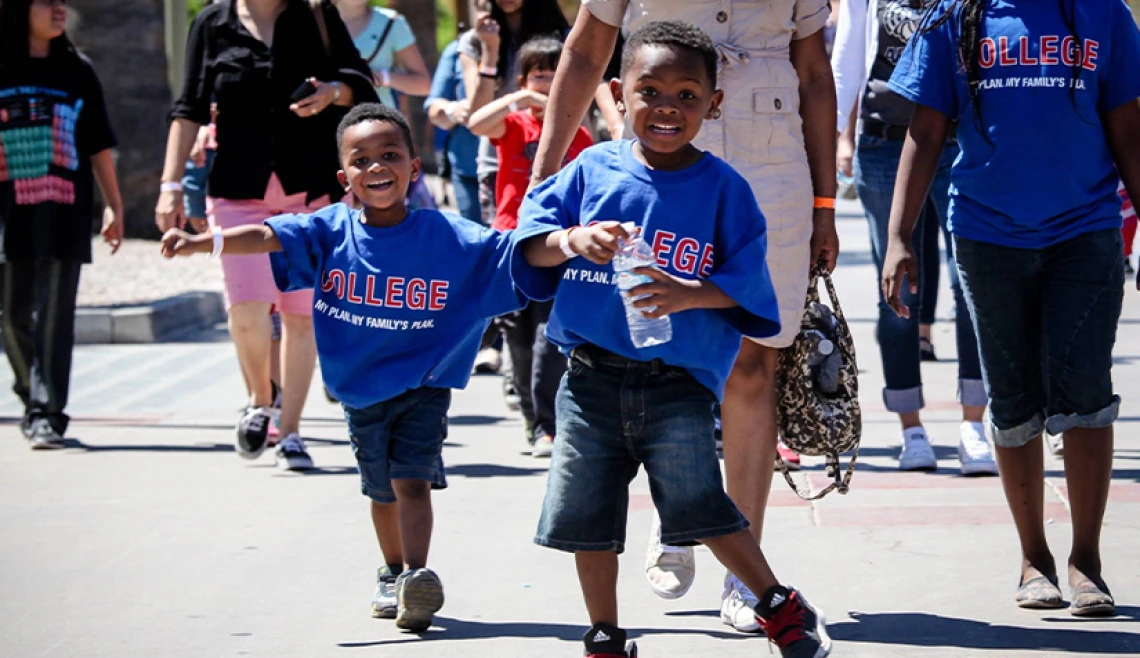K-8 Students
Image

K-8 Recommendations
The recommendations shared on this page are presented below as associated with a certain grade level, however, many of the tips are applicable throughout a student’s and family’s K-8 experience.
Kindergarten
- Parental Involvement: Attend school events and show interest in your child's activities.
- Open-ended Questions: Ask about their favorite parts of school and what they enjoy learning.
- Reading: Read to your child regularly to foster a love for books and learning.
- Future Plans: Discuss simple future aspirations like what they want to be when they grow up.
1st Grade
- Positive Feedback: Encourage and praise efforts in academics and other activities.
- Encourage Persistence: Initial failures are not typically the end point, they often are the beginning of learning. Early messages that emphasize this promote persistence in learning.
- Career Exploration: Introduce age-appropriate books and activities that explore different professions.
2nd Grade
- Family Involvement: Share family stories about education and careers to broaden their understanding.
- Homework Environment: Create a dedicated space at home for homework and reading.
- Extracurricular Activities: Encourage trying new activities like sports, arts, or clubs to discover interests.
3rd Grade
- Organization Skills: Help your child establish routines for homework and extracurricular activities.
- Academic Support: Stay informed about their progress in school and provide assistance with any challenges.
- Future Planning: Introduce the concept of setting goals for the future and discuss potential careers.
4th Grade
- Problem-solving Skills: Encourage independent problem-solving and decision-making.
- Discuss Choices: Talk about the consequences of choices at school and home.
- Family Discussions: Use family time to discuss the importance of education and future aspirations.
5th Grade
- Transition Preparation: Research and discuss the transition to middle school, emphasizing academic readiness. Transitioning to a new academic level is a great opportunity to assess your students successes and challenges in the Sweet 16. Bringing forward family, school or community resources to help students with challenging subjects will help students be prepared for the coursework they will face in middle and high school.
- Community Engagement: Encourage community involvement and helping others.
- Role Models: Help your child identify role models in fields of interest and discuss their achievements.
6th Grade
- Academic Planning: Introduce the use of a daily planner and teach time management skills. Consider a family calendar.
- Career Exploration: Discuss a variety of career options based on their interests and strengths.
- Family Aspirations: Share your family's aspirations for higher education during meetings with school counselors.
7th Grade
- Academic Achievement: Recognize and celebrate achievements in math, English, and science. Academic challenges are also important to recognize. Bringing forward family, school or community resources to help students with challenging subjects will help students be prepared for the coursework they will face in middle and high school.
- Social Development: Monitor social development and social relationships. Keep conversations open to discuss challenges they may face when interacting with others..
- Summer Enrichment: Explore opportunities for summer enrichment programs or activities related to their interests.
8th Grade
- High School Transition: Attend high school information sessions together and discuss expectations. The Sweet 16 Courses are particularly important as your student transitions to high school.
- College Exploration: Research 1-3 colleges of interest, visit their websites or attend open houses if possible.
- Career Exposure: Arrange for your child to shadow a professional or visit workplaces in fields they are interested in. Consider conversations that engage your child in identifying problems they would like to solve and find academic and career pathways that may help them make this difference.
Sweet 16
These core academic courses required for admission begin as early as elementary school and can impact admission. Understanding these courses can help us to celebrate students’ successes, but also to provide early support in areas where challenges may be encountered by a student.

